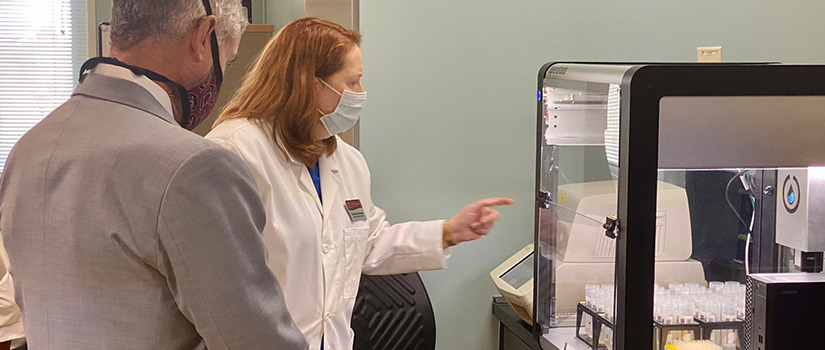Posted on: August 19, 2020
Over the summer, the College of Pharmacy’s Diagnostic Genomics Lab, installed a robotic liquid handler, with the intent to handle a testing pipeline for COVID-19. The testing will support the college’s newly launched COVID-19 testing for students, faculty and staff using saliva samples, called the Saliva Assay Free Expedited (SAFE) Testing. The robot will also support the research of several faculty members in the Department of Drug Discovery and Biomedical Research.
Phillip Buckhaults, Ph.D., associate professor in Drug Discovery and Biomedical Sciences, along with Michael Shtutman, Ph.D., associate professor and Michael Wyatt, Ph.D., professor, as well as lab volunteers, have spent the last several months developing a COVID-19 saliva test. It became apparent that, in order to handle the testing needs of all returning UofSC students, faculty and staff, multiple robotic liquid handlers would need to be connected together and operating on a 24/7 basis, significantly increasing the number of COVID-19 tests that can be run each day.
The addition of this robot improves testing capabilities by processing hundreds of samples per day without error ... This will help us more quickly identify those who are positive for COVID-19, who often do not know it.
Phillip Buckhaults, Ph.D. Associate Professor, College of Pharmacy
Buckhaults says one of the primary benefits of the robot is that it never gets tired and does not make mistakes. “The addition of this robot improves testing capabilities by processing hundreds of samples per day without error,” says Buckhaults. “Each robot can process 96 samples in 40 minutes, and the PCR on these samples will be done in approximately two hours. This will help us more quickly identify those who are positive for COVID-19, who often do not know it, and they can better plan to quarantine and protect vulnerable people.”
The lab has been approved for certification through Certification Laboratory Improvement Amendments (CLIA), administered through the Centers for Medicare and Medicaid Services (CMS) and ensures quality laboratory testing.
Carolyn Banister, Ph.D., will serve as manager for the laboratory. “Having this certification allows us to move from a research phase to a clinical diagnostic phase,” she says. “In other words, we can provide a diagnosis to those to who provide a saliva test.”
Banister says the certification will also add a new level of experience for students. “Our students will benefit greatly because they will have an additional clinical rotation,” she adds. “This will provide a firsthand experience in understanding how testing works and how to interpret the tests.”
Buckhaults adds that our pharmacy students will learn the logic of advanced liquid handling automation to generate precise workflows and can learn Python programming. “Pharmacy students will also have the opportunity to manage and distribute data to improve public health.”
Nephron Pharmaceuticals Corporation, owned and led by alumni Lou and Bill Kennedy, who have a longstanding commitment to the education and welfare of our university community, donated the robot to the College of Pharmacy.
